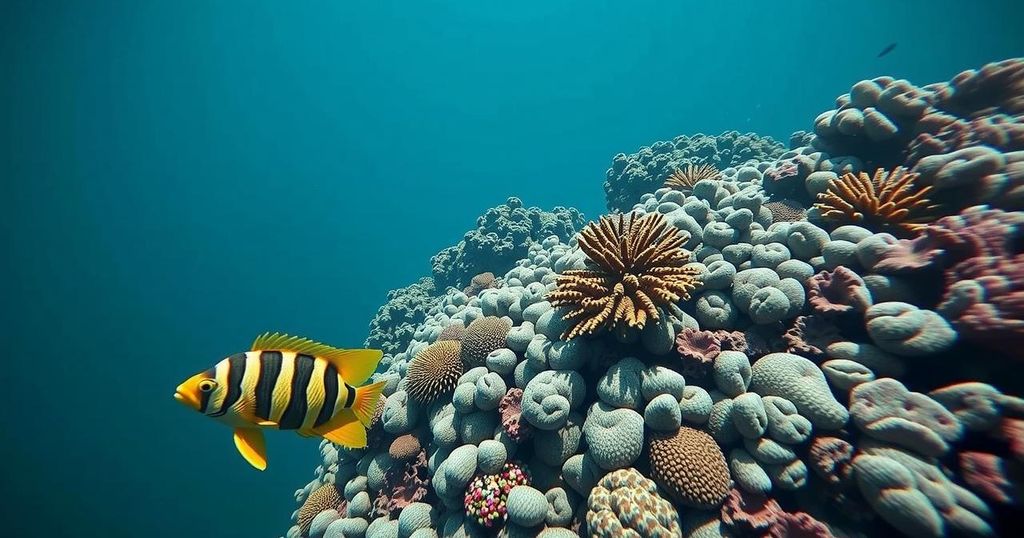The UN emergency session at the biodiversity summit in Colombia highlighted that 77% of global coral reefs are affected by bleaching, prompting a call for increased funding for conservation. Governments pledged $30 million to a UN fund aimed at protecting coral ecosystems. With rising climate threats, urgent actions are required to safeguard these vital habitats for the future.
The United Nations (UN), alongside scientists and governmental representatives, convened an urgent meeting on Wednesday to emphasize the necessity of increased funding for coral reef conservation in light of a significant and alarming increase in coral bleaching worldwide. As per recent research, approximately 77% of the global coral reefs are currently experiencing bleaching phenomena, predominantly attributed to rising ocean temperatures, a direct consequence of anthropogenic climate change. This event marks the fourth recorded instance of mass coral bleaching and has been observed across both hemispheres, as noted by the United Nations Capital Development Fund. This alarming data prompted an unusual emergency session at the ongoing U.N. biodiversity summit (COP16) in Cali, Colombia, a gathering usually reserved for active conflict or natural disaster discussions. Coral reefs, regarded as crucial ecosystems, provide habitat for over 25% of marine species while supporting nearly one billion individuals, many of whom depend on these habitats for sustenance, protection against coastal erosion, and livelihood. In the aftermath of the emergency session, representatives from New Zealand, the United Kingdom, Germany, and France announced a collective commitment of approximately $30 million to the U.N. fund for coral reefs, established in 2020. The fund aims to leverage up to $3 billion by 2030, utilizing both public and private finances to bolster conservation initiatives, with approximately $225 million secured thus far. U.K. Minister for Nature, Mary Creagh, remarked, “Protecting our ocean and its precious habitats is fundamental to life on earth. But without urgent action, the world’s coral reefs face extinction from global heating, acidification, disease, and pollution; a vital ecosystem lost within our lifetime.” Looking ahead, a U.N. ocean conference is set for Nice, France, in 2024, with a goal of mobilizing an additional $150 million for the coral reefs fund prior to this meeting. Peter Thomson, the U.N. Secretary-General’s Special Envoy for the Ocean, stated, “In 2024, climate change and other human impacts triggered the fourth mass coral reef bleaching event, the most extensive and devastating on record. With the window to protect these ecosystems closing rapidly, world leaders must act now. We must secure a sustainable future for coral reefs and the countless lives that rely on them — before it’s too late.” Fluctuations in water temperature can lead to coral expelling the algae that supply necessary nutrients, resulting in bleaching and stress. Other factors, such as pollution, low tides, or excessive sunlight, can also contribute to this phenomenon. Notably, in Australia’s Great Barrier Reef— the largest coral reef ecosystem—bleaching impacted 90% of the coral evaluated in 2022. Additionally, the Florida Coral Reef, the third-largest globally, faced considerable bleaching last year. Kenyan marine ecologist David Obura, who leads Coastal Oceans Research and Development in East Africa, stated that earlier mass bleaching events took place in 1998, from 2011 to 2013, and again in 2016. He expressed concern that, “They’re lasting more than one year at a time, which is worrying.”
Coral reefs play an essential role in marine ecosystems and the livelihoods of people worldwide. They support diverse marine life and provide critical benefits including food security and coastal protection. However, they are under severe threat from climate change, leading to widespread bleaching events, which jeopardize their existence and the services they render to both marine biodiversity and human communities. As climate change continues to intensify, the urgency for protection and restoration measures becomes paramount, necessitating increased funding and international cooperation for effective conservation efforts.
In conclusion, the significant and alarming findings regarding the mass bleaching of coral reefs necessitate an urgent and coordinated financial response from global entities. With a considerable percentage of the world’s reefs affected, and substantial commitments made from various governments, it is imperative that immediate actions be taken to secure the stability of these vital ecosystems. The role of coral reefs is crucial for marine biodiversity and human livelihoods, thus highlighting the need for sustained efforts to prevent their potential extinction.
Original Source: www.voanews.com







